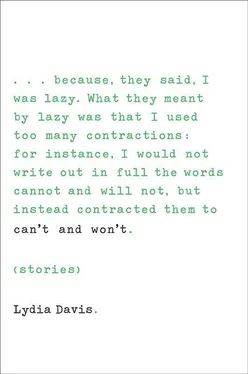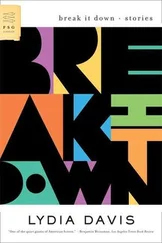I also tell myself that many people in the world have awful jobs, and that compared to those jobs, this is a good job.
I have been writing to you at length about teaching. That is because when your grant came, I thought I wouldn’t have to teach anymore. I also thought, and still think, that because you took enough interest in my work to give me the grant, you would be interested in everything about me and everything I had to say. I know this may not be true, but still I choose to believe that you care about how I am and what I am doing.
* * *
My mental habits are so fixed that I go on thinking the same things in the same way even when my circumstances have changed. But for a while, after the news, my vision of things widened. I saw more, on the peripheries, and I also observed and took pleasure in my wider vision itself. On one day, at least, I got into my car and drove into neighborhoods I had never explored before. I explored the new space, or the new time, that had been given to me. Then, maybe under the pressure of the various jobs in the spring, my vision narrowed again, I became intent on what I had to do, I concentrated on the next thing I had to do and not on my larger prospects. My vision led me only from breakfast to lunch and from lunch to dinner.
Then, when I finished all the work I was scheduled to do in the spring, a deep laziness set in, to my surprise. What began as a great relaxation, once the pressure was lifted, became an endless, boundless laziness in which I willfully refused to do most of what was asked of me unless the person asking was right there in front of me. Any request from a distance, any letter or any other communication, I simply ignored. Or I answered it quickly so as to make it go away. I said I was too busy to do whatever it was they wanted, too occupied. I was too occupied with doing nothing.
Usually I am a person of great energy. I can tackle any job, if asked, I can make myself do it, I can accomplish a whole string of tasks in succession at great speed and with great attention at the same time. Now, just when I was given such an opportunity to work on a project requiring research, for instance, all my energy deserted me suddenly, I was helpless, I said over and over again to anyone who asked me, “I’m sorry, I’m too busy, I have too much to do already.”
No one could know, after all. Maybe I was really busy and maybe I wasn’t. Sometimes I said, “Could you please ask me again in a year?” because some of them were friendly, good people and I did not want to disappoint them. I wanted to do whatever it was that they were asking, as long as I did not have to do it just then. I could certainly imagine having the will and the energy to do it at some point in the future.
I tried to think what the reason might be for this strange laziness. It might be this: I had been given something I did not have to earn, something other people considered important, but I did not feel very important myself. I had not felt very important before, and now this thing that I had been given had reduced me further. I was certainly much smaller and less important than what had been given to me. I was only a recipient, in this interaction. A recipient is not very active or important. The Foundation was active, giving me the money. It had changed my life for a while, with one decision and one phone call. I was active only to the extent of saying, Thank you! Thank you! After two years, the grant would be over. My gratitude would have been very active all that time — but would I have done anything?
Then some of my energy returned, and I was able to do some of what I had to do, though not much at a time — a single business letter on one day, and a single personal letter on another. I had not yet written the letter to the Foundation. I realize now that I was wrong to promise you a letter. You had not expected one, but because I promised one, you would now be expecting one, and you would now think that I was someone who did not do what she promised to do.
* * *
One day late in the summer that first year, I was riding the bus along the same route I always took to go to class. That day it happened to be the first part of a much longer trip that would take me far away, nowhere near the college. But I noticed, as I rode north on the bus, how the same misery closed around me, even though I was not on my way up to the college. How strange, I thought: the memory is still too vivid for me to be able to contemplate it calmly. The memory of that misery was itself too filled with misery — that misery was too close, as though it were still lying there in wait for me, as though I might slip over into that alternative reality at any moment.
It may be hard for you to believe that I find some small enjoyment in what comes before the class itself, just because it is not the class, just because I am not yet even on the campus. For instance, I take some satisfaction in the little stages of the trip itself: first the bus from my town north to that small city, then the city bus out to the college campus. The city bus costs me nothing if I show my college ID, and I enjoy this privilege more than you would think. To get from the first bus to the second, there is a brisk walk in the morning sunlight from the bus station over to the main downtown street. The walk lasts seven minutes, during which I pass a restaurant where, at that hour, an employee is always washing down the terrace and setting out the tables and chairs. After I pass this restaurant, I cross the wide main street and then turn left and walk uphill a few blocks to the city bus stop. This uphill walk is good for my heart, I always say to myself.
Before I pass the restaurant, I pass a travel agent, and of course the travel agent, combined with the restaurant, its outdoor tables and its early-morning activity, make me think of a foreign country, a place far away. I feel for just a moment as though I am far away, and that makes me wish even more that I were not here.
If I take the city bus a little later than usual, there is an extra stop on the route, and I prefer this route because it takes more time: the bus, after leaving the city limits, enters a large isolated office complex where the workers are often walking energetically around the looping sidewalks in pairs or alone. Very rarely does anyone get off or on the bus at this stop.
To comfort myself, I often think for just a moment of a certain great, strange, and difficult French poet who taught in a high school year after year because he had no other way to earn his living. Year after year, the students in the school made fun of him. Or at least that is what I remember reading somewhere.
* * *
The cafeteria in the bus station is where I spend the last part of my week, the evening before my late bus home. This evening is a peaceful time, perhaps the most peaceful of the week, filled with the enormous relief of having just finished the week of teaching and having before me the longest possible stretch of time before the next week begins, bringing with it the first class of the week.
I buy something, usually a cup of hot chocolate, in order to be able to sit down, and then I find a clean table, or I wash off a part of a table to make a clean place for my things. I settle down to read or correct papers. The tables in the cafeteria are ample and strong and well made, with smooth surfaces of a nice yellow hard plastic, with edges of light-colored laminated wood. I am perfectly happy with my cup of chocolate, my white napkin, and my book or my papers. Nothing is lacking in that interval of time. The two hours or so pass in perfect tranquillity, a tranquillity that would not be possible in a more complicated situation, one with more choices, for instance. There are noises all around me, but no noise bothers me. I listen to the staff of the cafeteria talk to one another and joke and laugh, and I feel that they are companions of a sort. I take comfort in the noises of the game machines that occupy one corner of the place, the most persistent noise being the solemn narrating voice that introduces the “18-Wheeler” game, the repeated horn blasts of the game’s tractor-trailer; the thumps, cries, and metallic crashes of another game, like heavy swords clashing or infinitely repeated roadwork; and colliding with these noises, the young and enthusiastic recorded voice that introduces the “Sports-Shooting USA” game, along with the recorded roars of the crowds of spectators.
Читать дальше












